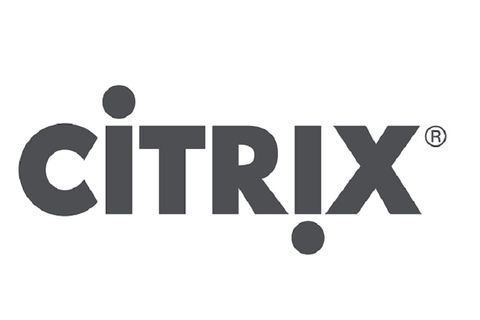CloudPro Verdict
Pros
- +
Unlimited external users; Free tier available
Cons
- -
Steep learning curve - sometimes confusing interface
Citrix's Podio is an online collaboration suite that provides lightweight project management, team coordination, customer relationship management (CRM) and product development planning. Under the bonnet, it's a flexible application and relational database platform that allows you to collect and use data in either custom or pre-built apps, rather than relying on the traditional language of forms and tables that you'd get with a more typical data suite.
Because it's cloud-based and geared towards communication, Podio also provides a single hub that your staff can use to coordinate and plan their workflow, with the intention of making it easy to see what everyone's involved in and to invite others to participate in relevant projects.
It's available on a number of different payment plans, starting with a free tier for small businesses with five or fewer users. Larger companies will have to pay $9 per employee, per month on the Basic tier, but can register their domain with Podio and invite unlimited external users to participate in projects.
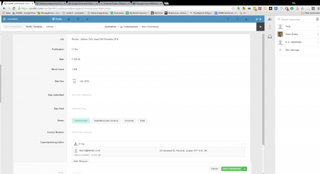
Podio is built to store, track and relate information
However, Podio Basic only provides very spartan task and user management capabilities. If you require more features, a variety of additional tiers are available. Podio Plus, priced at $14 per staff member, per month, adds automated workflows, allowing you to automate routine tasks that your staff would otherwise have to perform manually. You're also able to create read-only content that selected groups of users can view and comment on without giving them full editing access and get an extra 'light user' role to help you classify what your staff can and can't do by default.
Beyond that comes the Podio Premium service. Priced at $24 per employee, per month, it's considerably more expensive than the entry-level tiers. It's also the first tier at which you can generate visual reports. If you have an annual subscription at this level, you'll also be able to sync contacts from other services such as Google Apps for Work and use built-in interactive sales dashboards to help your team track their successes. If you have a five-seat or greater subscription, you'll also get an advanced integrated workflow tool from Globiflow thrown in. However, it's worth noting that monthly subscribers with fewer than five user accounts don't get most of these features.

Once you've linked another web based service, such as Google Docs, you can easily import contacts and files
Finally, Enterprise tier users can get bespoke packages including extra customer support and training, encrypted file sharing and storage for large files, and support for e-signatures and fully tracked document sending.
All your data is stored in a datacentre located in Dublin, which means that Podio meets the requirements for EU data protection law. UK data protection requirements could change over the coming years though in light of the EU referendum and Brexit.
The Basics
Podio is massively flexible and feature-packed, with a range of optional apps that you can use for everything from lightweight project management, sales and CRM tracking to building a communications oriented intranet, as well as the ability to create your own custom apps to meet your company's precise needs.
Unfortunately, this means that getting started with it can be a daunting task. If you're familiar with relational databases, it helps to bear in mind that Podio is, in essence, an extremely capable database front end, although Podio doesn't currently allow you to edit tables directly.
Podio provides Getting Started documentation and plenty of detail about how to use its features. This is all in a separate help centre, but we'd have welcomed much more hand-holding and guidance built into the main interface. The Getting Started guide in particular is heavily dependent on video content, which is less accessible, less searchable and more time consuming to refer to than text-based documentation.
Podio has integrated text chat, which you can use to communicate with both internal and external users via a chat pane that can be expanded from the right of the screen. You can also open a video or audio call with the user, which immediately launches a video chat session or a third-party service.
Workspaced Out
The fundamental unit of division in Podio is the workspace. When you create a workspace, you can choose which members of your team and which external contractors have access to it and, most importantly, add functions to it in the form of Podio's many integrated apps.
A Demo Workspace is automatically created to help you get to grips with some of Podio's core features. This workspace comes equipped with a few Podio apps populated with dummy data. These include the sales-oriented Leads and Clients tool, where you can add companies you deal with and assign staff to follow up sales leads with them, a vaguely Pinterest-like Inspiration board where staff can pin reference material and ideas for future projects, a staff Expenses tracker and a Meetings organiser.
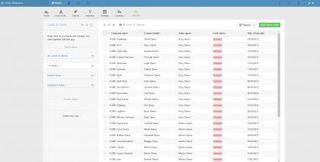
Podio's demo workspace shows off readymade apps for a range of functions including client and sales lead management
It's a really helpful example of a small sales-oriented workspace and effectively demonstrates some of Podio's versatile features, but it should be more clearly signposted and thoroughly documented. A few other workspaces are created for you, such as an employee network that you can use to communicate with other users who have an email address on your business's domain. There’s also an intranet that comes preloaded with apps to help you create an FAQ for your staff and keep track of holidays and meetings.
For either large individual projects or multiple projects carried out for the same client, it's often worth setting up a dedicated workspace so you can configure it with exactly the apps needed for the job. However, if you do a lot of small projects or piecework, then it's often most convenient to create workspaces based on the kind of work being done, whether that's writing, sales or software development.
Podio's Plus tier gives workspace creators and administrators the extra ability to designate some of the users they've invited as "light role" members, which mean they can use and view content in the workspace, but can't create apps or invite new members. You can also set users up as regular members, who can do everything except adjust the workspace's core settings, and guests, who only have access to selected items they've been invited to view. Plus also allows users to share content in read-only mode.
App to it
Apps are at the heart of how Podio works, and there are an almost overwhelming number of readymade ones to choose from in the free App Market, from generic file libraries and client lists to apps designed specifically for the legal, financial and property trades.
However, if there isn't an app that meets your needs, it's easy to create your own. We put together a commission tracker in a few minutes by dragging into place relevant text and numeric fields to describe the job and its associated fee, date fields for due and payment dates, a status selector, and a contact selector linked to a contacts database that we'd already populated.
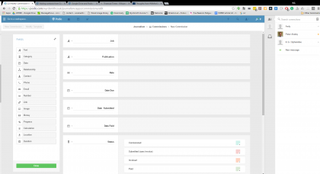
Creating your own apps is a simple click and drag process
The ability to relate any app to any other app is an incredibly powerful feature: behind the scenes Podio is creating databases of your content, and its app creator, like rival QuickBase's, makes drawing together that data an easy and non-threatening experience for even relatively non-technical staff.
Within individual apps, you can automatically generate web forms that allow you to integrate them into an external website – extremely useful if you're dealing with user feedback, support ticketing, or just want to make it easy for colleagues who don't need access to Podio's other features to contribute data. You can also directly import and export data in Excel's XLSX format. Podio Plus users get helpful workflow automation tools that can automatically generate tasks, and create and update items in either the current app or another one in the same workspace when, for example, an entry is created or updated in a task or contact list.
Extend
Even taking its apps into account, Podio is a little light on features that you'd take for granted in dedicated tools for project management or CRM. For example, we immediately noticed the absence of any kind of integrated Gantt chart creation tool. However, the Podio platform is highly extensible, and a wide variety of third-party add-ons and extensions are available in addition to its own app library.
Even SMBs using the Basic tier - whether for free or, with more than five users, at $9 per user - get access to these extensions, as do all other users. This makes even a basic subscription potentially useful if free or low-cost add-ons give you all the features your business needs.
Some, such as SmartGantt, are commercial products that you'll have to subscribe to separately and which you'll thus need to account for in your budget. For instance, SmartGantt costs $6 per month on its monthly plan or $5 per month on an annual plan. It's also worth noting that you have to manually select and configure what data appears on your Gantt chart. Although flexible, this is less immediately approachable than what you'll find in most dedicated project management suites which provide more default options.
However, many free extensions are also available. Timeline for Podio is a free tool that gives you a Gantt-style project timeline with an optional progress slider. Its maker, Oval Business Solutions, also provides Podio extensions to add mapping capabilities via Google Maps and generate CSS to customise your Podio web forms.
Time tracking and cross-format export tools are also popular, while the paid-for Podbox syncing tool makes it easy to integrate Podio with other web apps, services and CRM platforms, ranging from Salesforce and OpenERP to MailChimp, Shopify and Zendesk, as well as any custom database-driven systems your company may use.
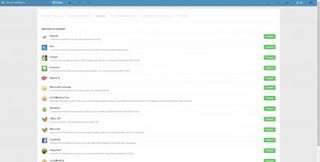
Creating your own apps is a simple click and drag process
Additionally, each user can also link other cloud services accounts to Podio, making it easy to import documents, data and contacts from services including Google Apps for Work, Office 365, Citrix Sharefile, Dropbox, Box and SugarSync. You can also connect with your office's Exchange server to export Podio calendars and use GoToMeeting for video conferencing as an alternative to appear.in which is the default video chat service.
As you'd expect from any SaaS worth its salt, mobile apps are available for Android and iOS. They're polished and very capable, allowing you to access all your Podio apps and settings, no matter where you are. This is particularly handy if you've created apps that allow staff to submit expenses or reports while working away from the office.
Conclusions
Podio is an extremely capable alternative to the reams of spreadsheets, local databases and shared documents that many businesses rely on. It makes it easy to communicate with colleagues and contractors, as well as allowing everyone in your company to build their own project spaces. It's a jack-of-all-trades, that can be pressed into a wide range of different uses. Having said that, if you need, for example, highly specialised project management capabilities, dedicated software such as Asta Powerproject is still a better option.
Podio suffers from a slightly confusing presentation and a steep learning curve that makes it less approachable than it might otherwise have been. Its interface, although entirely capable, is less attractive than rival QuickBase's. However, Podio is cheaper than QuickBase and its free five-user tier means that your company has ample time to get to grips with its interface and capabilities before you have to spend anything.
Verdict
A flexible tool that allows you to develop apps to track your business and projects, rather than relying on traditional spreadsheets and databases.
K.G. is a journalist, technical writer, developer and software preservationist. Alongside the accumulated experience of over 20 years spent working with Linux and other free/libre/open source software, their areas of special interest include IT security, anti-malware and antivirus, VPNs, identity and password management, SaaS infrastructure and its alternatives.
You can get in touch with K.G. via email at reviews@kgorphanides.com.
